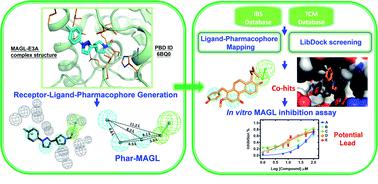Our official English website, www.x-mol.net, welcomes your
feedback! (Note: you will need to create a separate account there.)
Discovery of 8-prenylnaringenin from hop (Humulus lupulus L.) as a potent monoacylglycerol lipase inhibitor for treatments of neuroinflammation and Alzheimer's disease
RSC Advances ( IF 3.9 ) Pub Date : 2021-09-20 , DOI: 10.1039/d1ra05311f Min-Che Tung, Kit-Man Fung, Hsin-Mie Hsu, Tien-Sheng Tseng
RSC Advances ( IF 3.9 ) Pub Date : 2021-09-20 , DOI: 10.1039/d1ra05311f Min-Che Tung, Kit-Man Fung, Hsin-Mie Hsu, Tien-Sheng Tseng

|
Monoacylglycerol lipase (MAGL), a serine hydrolase, converts endocannabinoid 2-arachidonoylglycerol (2-AG) to arachidonic acid (AA) and glycerol in the brain and plays a bidirectional role in controlling nueroinflammation. MAGL, involved in Alzheimer's and Parkinson's diseases, is a promising target for treatment of neurodegenerative disorders. However, the irreversible inhibitors of MAGL lead to the desensitization of CB1 receptors further impairing the benefits associated with the indirect CB1 stimulation. Therefore, development of potent reversible inhibitors from natural products (NPs) and traditional chinese medicines (TCMs) are safer and free from adverse side effects and feasible to avoid drawbacks which irreversible inhibitors cause. Here, we employed pharmacophore-based screening of drug candidates coupled with molecular docking, biochemical assay and Ligplot analyses to identify and characterize inhibitors targeting human MAGL (hMAGL). The built pharmacophore model, Phar-MAGL successfully identified inhibitors NP-2 (IC50 = 9.5 ± 1.2 μM), NP-5 (IC50 = 14.5 ± 1.3 μM), and NP-3 (IC50 = 15.2 ± 1.4 μM), which apparently attenuated the activities of hMAGL in vitro. The evident activities of the identified inhibitors against hMAGL showed that the pharmacophore model, Phar-MAGL is reliable and efficient in screening inhibitors against hMAGL. Our study successfully identified a natrual product inhibitor, NP-2 (8-PN), from the plant Humulus lupulus L. (hops) and its positive effects in neurogenesis and neurodifferentiation along with the evident inhibitory potency against hMAGL revealed the potential for further optimizing and developing into drugs to treat neuroinflammation, Alzheimer's and Parkinson's diseases.
中文翻译:

发现啤酒花 (Humulus lupulus L.) 中的 8-异戊二烯柚皮素是一种有效的单酰基甘油脂肪酶抑制剂,可用于治疗神经炎症和阿尔茨海默病
单酰基甘油脂肪酶 (MAGL) 是一种丝氨酸水解酶,可在大脑中将内源性大麻素 2-花生四烯酸甘油 (2-AG) 转化为花生四烯酸 (AA) 和甘油,并在控制神经炎症方面发挥双向作用。MAGL 涉及阿尔茨海默病和帕金森病,是治疗神经退行性疾病的有希望的目标。然而,MAGL 的不可逆抑制剂导致 CB1 受体脱敏,进一步削弱了与间接 CB1 刺激相关的益处。因此,从天然产物(NPs)和中药(TCMs)中开发有效的可逆抑制剂更安全、无不良副作用,并且可以避免不可逆抑制剂引起的弊端。在这里,我们采用了基于药效团的候选药物筛选以及分子对接,生化测定和 Ligplot 分析以识别和表征针对人类 MAGL (hMAGL) 的抑制剂。建立的药效团模型,Phar-MAGL 成功鉴定了抑制剂 NP-2(IC50 = 9.5 ± 1.2 μM)、NP-5 (IC 50 = 14.5 ± 1.3 μM) 和 NP-3 (IC 50 = 15.2 ± 1.4 μM),它们在体外明显减弱了 hMAGL。已鉴定的针对 hMAGL 的抑制剂的明显活性表明,药效团模型 Phar-MAGL 在筛选针对 hMAGL 的抑制剂方面是可靠且有效的。我们的研究成功地从植物Humulus lupulus L.(啤酒花)中鉴定出一种天然产物抑制剂 NP-2 (8-PN),其对神经发生和神经分化的积极作用以及对 hMAGL 的明显抑制效力揭示了进一步优化的潜力并发展成为治疗神经炎症、阿尔茨海默病和帕金森病的药物。
更新日期:2021-09-20
中文翻译:

发现啤酒花 (Humulus lupulus L.) 中的 8-异戊二烯柚皮素是一种有效的单酰基甘油脂肪酶抑制剂,可用于治疗神经炎症和阿尔茨海默病
单酰基甘油脂肪酶 (MAGL) 是一种丝氨酸水解酶,可在大脑中将内源性大麻素 2-花生四烯酸甘油 (2-AG) 转化为花生四烯酸 (AA) 和甘油,并在控制神经炎症方面发挥双向作用。MAGL 涉及阿尔茨海默病和帕金森病,是治疗神经退行性疾病的有希望的目标。然而,MAGL 的不可逆抑制剂导致 CB1 受体脱敏,进一步削弱了与间接 CB1 刺激相关的益处。因此,从天然产物(NPs)和中药(TCMs)中开发有效的可逆抑制剂更安全、无不良副作用,并且可以避免不可逆抑制剂引起的弊端。在这里,我们采用了基于药效团的候选药物筛选以及分子对接,生化测定和 Ligplot 分析以识别和表征针对人类 MAGL (hMAGL) 的抑制剂。建立的药效团模型,Phar-MAGL 成功鉴定了抑制剂 NP-2(IC50 = 9.5 ± 1.2 μM)、NP-5 (IC 50 = 14.5 ± 1.3 μM) 和 NP-3 (IC 50 = 15.2 ± 1.4 μM),它们在体外明显减弱了 hMAGL。已鉴定的针对 hMAGL 的抑制剂的明显活性表明,药效团模型 Phar-MAGL 在筛选针对 hMAGL 的抑制剂方面是可靠且有效的。我们的研究成功地从植物Humulus lupulus L.(啤酒花)中鉴定出一种天然产物抑制剂 NP-2 (8-PN),其对神经发生和神经分化的积极作用以及对 hMAGL 的明显抑制效力揭示了进一步优化的潜力并发展成为治疗神经炎症、阿尔茨海默病和帕金森病的药物。










































 京公网安备 11010802027423号
京公网安备 11010802027423号